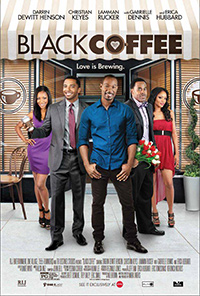Coffee Mate: Harris’s Latest a Heavy-handed, Yet Welcome Reprieve from the Norm
 A professed self-taught filmmaker, director Mark Harris’ latest film, Black Coffee, exudes a marked improvement in his mastery of the medium in that there are few technical related distractions in what stands as his fourth feature. With that in mind, the screenplay is another story altogether, peppered with certain elements that seem so out of touch the film might as well be described as science fiction. Paired with what appears to be a lack of understanding toward women (especially concerning its female protagonist, who is shown as unabashedly subservient in every regard, including in an occupation that glaringly supersedes that of her romantic interest’s) and blunt, overarching messages that are delivered with all the finesse of a barbed sledgehammer, one would assume that Harris’ latest is a valiantly woebegone effort. Happily, that’s not really the case, as there are several instances where something oddly arresting seems to happen, though these moments should be credited to a cast of seasoned actors that are, for the most part, playing everyday people.
A professed self-taught filmmaker, director Mark Harris’ latest film, Black Coffee, exudes a marked improvement in his mastery of the medium in that there are few technical related distractions in what stands as his fourth feature. With that in mind, the screenplay is another story altogether, peppered with certain elements that seem so out of touch the film might as well be described as science fiction. Paired with what appears to be a lack of understanding toward women (especially concerning its female protagonist, who is shown as unabashedly subservient in every regard, including in an occupation that glaringly supersedes that of her romantic interest’s) and blunt, overarching messages that are delivered with all the finesse of a barbed sledgehammer, one would assume that Harris’ latest is a valiantly woebegone effort. Happily, that’s not really the case, as there are several instances where something oddly arresting seems to happen, though these moments should be credited to a cast of seasoned actors that are, for the most part, playing everyday people.
Robert (Darrin Dewitt Henson) seems to have his enjoyable life in order with his successful job, a beautiful girlfriend (Erica Hubbard), and an immaculate home. But he’s in for a rude awakening when he’s suddenly and unceremoniously fired by his boss, Nate (Josh Ventura), the man that was hired to take over the company from Robert, which we learn had been established by Robert’s father. Things get rapidly worse when he realizes that his girlfriend has been two-timing him with Nate. Focused on how to go about with some sort of legal recourse, Robert leans on his cousin, Julian (Christian Keyes), who owns his own coffee company, which is apparently successful but still finds the entrepreneur hawking his product at a table outside his own apartment complex. Julian asks Robert to deliver a bag of coffee to a client one day, an attorney named Morgan (Gabrielle Dennis), who is just establishing her own law firm after a complicated divorce from her ex, Hill (Lamman Rucker). There’s an immediate attraction, and soon the two are wondering if they’re ready to be open to getting serious.
While there’s no question that Black Coffee will be bound to stereotype and classified as an urban film, it’s important to note that this isn’t a film that should be labeled or dismissed as such. More importantly, it’s also not pandering to the religious zealotry so innately marketed toward black audiences in films featuring a mostly black cast, and there are several passages of dialogue concerning religion and church that seem to be welcome observations from its characters. This is a surprise since Harris opens the film with an anonymous quote that has something to do with God and men and women, which is really just there to position the film as a marker of the heteronormative more than anything else (but at least we don’t have to hear the scripted brainwashing so vibrantly insidious in most of Tyler Perry’s films, or the disingenuous pandering of Think Like a Man).
And to its credit, there’s a definite level of onscreen charm from Darrin Dewitt Henson and Christian Keyes, the latter having the impossible feat of trying to make us believe that the owner of a coffee business would actually stand outside his apartment building (and not on the ground floor or in street view) to sell very expensive coffee exclusively to a revolving number of very attractive black women. And in a suit.
Of course, one of its final ‘on the nose’ moments revolves around building business within and supporting one’s own community, something that would have been more powerful if Harris could have managed for moments of subtlety, which the title alone does wonders for. There really isn’t such a thing as white coffee, after all (though, truth be told, it’s a bit distracting when one learns that Harris’ previous film was titled Black Butterfly). And while Gabrielle Denis and Erica Hubbard are charming presences onscreen, they are written as mere plot contrivances. Hubbard’s character is the comic relief harpy, but Denis is thrown under the bus, here playing an attorney that’s continually painted as weak and indecisive (and whose residence actually pales in comparison to that of the man she’s dating, who we’re led to believe only receives a salary working as a painter at a business that his father used to run).
Despite these glaring slights and fantastical discrepancies (and the horrid musical cues that plague the initial set-up), Harris’ Black Coffee never resorts to stale melodrama or cheap laughs, sticking true to a low key straight romance between characters that aren’t locked into stereotype. While intentions don’t override the failings of the end product, it’s an offering that’s certainly above being dismissed.
★★/☆☆☆☆☆


